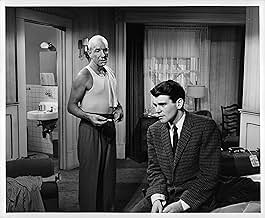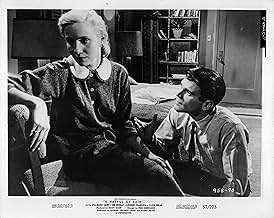CALIFICACIÓN DE IMDb
7.1/10
1.7 k
TU CALIFICACIÓN
Agrega una trama en tu idiomaA Korean War veteran's morphine addiction wreaks havoc upon his family.A Korean War veteran's morphine addiction wreaks havoc upon his family.A Korean War veteran's morphine addiction wreaks havoc upon his family.
- Dirección
- Guionistas
- Elenco
- Nominado a 1 premio Óscar
- 6 premios ganados y 10 nominaciones en total
Gerald S. O'Loughlin
- Chuch
- (as Gerald O'Loughlin)
Tom Ahearne
- Bartender
- (sin créditos)
William Bailey
- Man in Elevator
- (sin créditos)
Gordon B. Clarke
- Middle-Aged Man
- (sin créditos)
Heinie Conklin
- Barfly
- (sin créditos)
Albert Dannibal
- The Thin Man
- (sin créditos)
Sayre Dearing
- Barfly
- (sin créditos)
Art Fleming
- Jack
- (sin créditos)
Jane Hoffman
- Lone Woman
- (sin créditos)
Jason Johnson
- Boss
- (sin créditos)
Jay Jostyn
- Doctor
- (sin créditos)
Opiniones destacadas
My summary might scare off some, but this is not the infamous "Reefer" movies of earlier days. This film has a great cast, who work with a great script. Don Murray plays an unlikely addict because he acquired his habit as a wounded soldier. His addiction and effects on himself and family are the plot focus. The actors draw out our pity and condemnations. The film does not preach about addiction. The film does portray an ugly problem about drugs, be they legal or illegal. My generation which came to age in the 60's saw many films which showed the "fun" side of getting smashed or high. A great number of them are no longer living, or are shadows of themselves because of addiction.
10dga11105
I check at least once a month to see if this fabulous film has finally been released on video. Just like the way that "Days of Wine and Roses" tackled the subject of alcohol addiction, this film tackled the subject of drug addiction like none other before or since. Terrific performances by all, especially Don Murray and Anthony Franciosa as the two brothers, each held to a different standard by a overbearing father played by Lloyd Nolan. There is also an appearance by a very young William Hickey of "Prizzi's Honor" fame in one of his first roles. This film is a window back in time to life in New York City in the 50's. I urge whoever owns the rights to this film, please release it on DVD
Ah...the wealth of info that this website provides...never knew that our old pal Michael Gazzo wrote this play/screenplay...another piece of "Godfather" trivia I can now pepper my pals with....
And William Hickey's voice was a marvel of genetic engineering even back in his debut film...
"Hatful" may appear somewhat dated by today's standards and the direction and performances still seem more stage than film-oriented..but love seeing the old Brooklyn waterfront and those ESSO gas signs again...and the cast puts in a fine day's work...
If you liked this one...put "The Lost Weekend", "Man With The Golden Arm" and "Days of Wine and Roses" on the to-do list for comparison shopping purposes.
(And for you Tony Franciosa fans out there...you can now turn your attention to line 2 of Tom Waits' "Goin' Out West").....
And William Hickey's voice was a marvel of genetic engineering even back in his debut film...
"Hatful" may appear somewhat dated by today's standards and the direction and performances still seem more stage than film-oriented..but love seeing the old Brooklyn waterfront and those ESSO gas signs again...and the cast puts in a fine day's work...
If you liked this one...put "The Lost Weekend", "Man With The Golden Arm" and "Days of Wine and Roses" on the to-do list for comparison shopping purposes.
(And for you Tony Franciosa fans out there...you can now turn your attention to line 2 of Tom Waits' "Goin' Out West").....
Back in the 1950's, it was not normal to see a movie that addressed a social problem such as Heroin addiction. The film also slightly implicates the US Army as the source of Johnny's addiction when he was in the Army Hospital following spending months in a cave in Korea. The film pulls no punches as it displays the ruthless pushers who will "put you in the hospital with Willie DeCarlo" if you don't pay what you owe for the Heroin. It also shows how addicts will do anything to get their next "fix". One really feels for Johnny's brother Polo who works as a bouncer to get money for Johnny's habit and at the same time trying to hide the fact that his brother is an addict from Johnny's wife and thier father. In addition, as one who grew up in a NYC housing project in the 1950's and 60's i have to say the on location filming in the projects brings back lots of memories of what my project looked like. I am happy to say i have a good VHS version of the film i took off the OLD AMC years ago (before they ruined AMC with commercials.)
Good drama showing how a family can be far different than what it appears when certain members refuse to live in the present. Nolan was good as the bantam rooster of a father and Franciosa shone as the drunken yet solid older brother. As always Silva, with that cruel face, was well cast as a heartless pusher whose love for money can only lead to disaster. I wanted to slap his hyper little helper; what a creep.
¿Sabías que…?
- TriviaAnthony Franciosa was nominated for a Tony Award for his performance as Polo in the original Broadway production. He was nominated for an Academy Award® for reprising the role in this film. Features Franciosa's only Oscar®-nominated performance.
- ErroresWhen Johnny surprises Celia with dinner and flowers, the camera starts to back out of the kitchen, but something or someone runs into the curtain hanging on the right, causing it to move quite a bit.
- Citas
John Pope, Sr: Polo, You're a bum. You always were and you always will be.
- ConexionesReferenced in What's My Line?: Lew Hoad & Shelley Winters and Anthony Franciosa (1957)
- Bandas sonorasDon't Get Around Much Anymore
(uncredited)
Music by Duke Ellington
[Played at Marty's Bar after Pop and Johnny show up]
Selecciones populares
Inicia sesión para calificar y agrega a la lista de videos para obtener recomendaciones personalizadas
- How long is A Hatful of Rain?Con tecnología de Alexa
Detalles
Taquilla
- Presupuesto
- USD 1,820,000 (estimado)
- Tiempo de ejecución1 hora 49 minutos
- Color
- Relación de aspecto
- 2.35 : 1
Contribuir a esta página
Sugiere una edición o agrega el contenido que falta


































